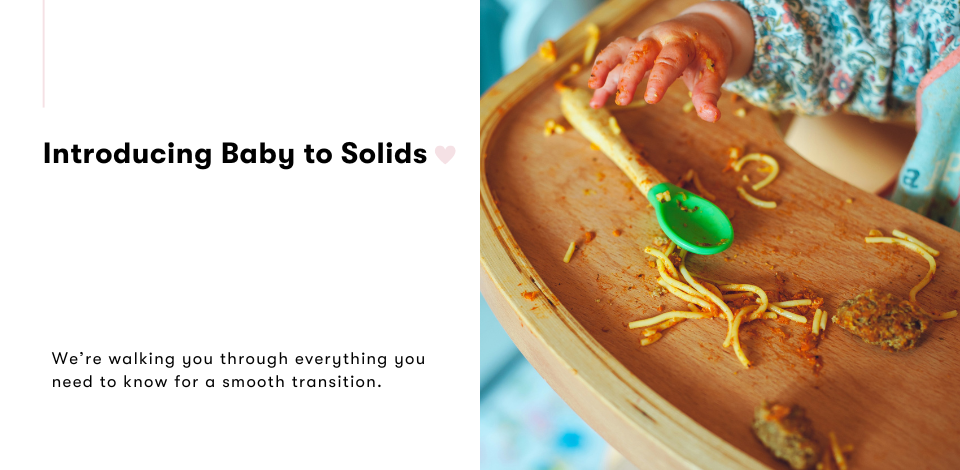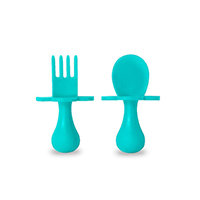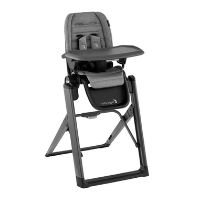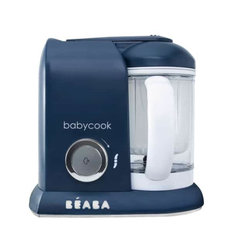Introducing Baby to Solids
Jump to Section

Introducing solid foods to your baby is a significant developmental milestone, marking the beginning of a new chapter in their nutritional journey. As parents, navigating this transition can be both exciting and daunting, filled with questions about what, when, and how to start.
While it’s crucial to chat with your healthcare provider (definitely reach out to them!), we’ve done the legwork to simplify how to introduce your little one to solids. In this comprehensive guide, we'll walk you through everything you need to know to make this transition smooth and enjoyable for both you and your little one.
When Do I Start Introducing My Baby to Solids?
Typically, babies are ready for solids around 6 months of age. Look for signs like good head control, sitting with support, losing the tongue-thrust reflex, and showing interest in what you're eating (they might even try to grab your food!). Remember, every baby is different, so there's no need to rush if your little one isn’t quite there yet.
How Much Solid Food Should They Have Daily?
At first, giving your baby solid foods is all about them exploring and figuring things out rather than just filling up. Begin with a tiny spoonful or two of mashed or pureed food once a day, and slowly add more as your little one gets more into it and gets better at eating. By around 9 months, you can aim for three solid meals each day plus snacks, alongside their regular breast milk or formula. For babies aged 8 to 12 months, they usually need about 750 to 900 calories daily. Around half of that should still come from breast milk or formula, which is roughly about 24 ounces.
What Solid Foods Should My Baby Eat First?
Baby’s first foods often vary depending on culture and from family to family. A general rule of thumb is to begin with simple, single-ingredient foods that are easy to digest, and less likely to cause allergies. It’s also important to start with foods that contain iron, as it’s needed for baby’s development. Offer a mix of textures like lumpy, tender-cooked, finely minced, pureed, mashed, or ground foods, as well as soft finger foods. As your baby grows older, gradually introduce foods with more texture.
Good starter foods around 6 months include:
- Pureed iron-rich meats
- Single-grain cereals with added iron
- Slowly add single veggies and fruits, blended smooth
When Can I Give My Baby Finger Foods?
Around 8-10 months, your baby will develop the pincer grasp (using thumb and forefinger) needed to pick up small objects. To prevent choking, start with soft, easy-to-swallow, bite-sized pieces of food like cooked vegetables or small fruit slices. Always supervise to prevent choking.
Other great starter finger foods include:
- Well-cooked pasta
- Scrambled eggs
- Soft cheese
- Well-cooked, finely chopped meat
- Baby Crackers
- Dry cereal
- Well-cooked, cut-up potatoes
What Foods Should My Baby Stay Away From and Why?
Before babies hit their first birthday, it's best to steer clear of certain foods that could cause choking, allergies, or tummy troubles.
Here's what to skip:
- Honey: It might have bacteria that can give babies botulism because their tummies aren't ready for it yet.
- Cow's Milk: Wait until after their first birthday to give them whole cow's milk as a main drink. Stick with breast milk or formula until then because it has what they need.
- Raw or Undercooked Eggs: Can give babies salmonella, which is worse for them than for grown-ups.
- Big Chunks: Foods like whole grapes, nuts, popcorn, or big pieces of veggies can be a choking risk. Chop 'em small or mash 'em up.
- Seafood: Hold off on shellfish, high-mercury fish, and raw seafood. They might cause allergies or have stuff that's not good for babies.
- Salt and Sugar: Their kidneys aren't fully grown yet, so too much salt can be tough on them. And sugar might make them crave sweets and cause dental issues later on.
- Certain Fruits and Vegetables: Some fruits like citrus (which can cause diaper rash or stomach upset) and vegetables like spinach (which contains nitrates that can be harmful in large amounts) are best introduced carefully and in moderation.
Remember to introduce new foods one at a time and keep an eye out for any reactions. If you're unsure about something, it's always smart to talk to your paediatrician.
Speaking of allergies…
How Do I Introduce Common Food Allergens?
Recent research now suggests that holding off on common allergen foods doesn’t necessarily prevent allergies. In fact, introducing them early might even lower the chances of developing them.
So, once your little one has tried foods like cereal, meats, fruits, and veggies with no issues, you can slowly introduce them to:
- Peanuts
- Tree nuts
- Eggs
- Dairy stuff like cheese and yogurt
- Wheat
- Shellfish like shrimp and crab
- Fish
- Soy
- Sesame seeds
Make sure that when introducing these they are soft and cut up into small, baby-safe pieces. Also, make sure to have some oral antihistamine handy just in case. Start with a small amount and increase slowly if there’s no bad reaction.
What Normal Side Effects Can I Expect?
As your little one tries out new foods, you might see some changes in their poops or a bit of a grumbly tummy now and then. That's pretty normal stuff. But keep an eye out for signs like a rash, throwing up, or loose stools that could mean they're allergic to something. If you think it's an allergy, stop giving that food and give your paediatrician a shout for advice.
Some Tips for Feeding Baby:
Start Slowly: Introduce one new food at a time, waiting 3-5 days before starting another. This helps pinpoint any potential allergies.
Texture Matters: Begin with smooth purees and gradually move to thicker textures and soft, mashed foods as your baby gets more comfortable.
Use Baby-Friendly Utensils: Opt for soft-tipped spoons and easy-to-hold bowls or plates designed for babies.
Create a Positive Atmosphere: Make feeding time enjoyable by sitting together and minimizing distractions. Turn off screens and focus on the meal.
Be Patient: It’s normal for babies to take time to adjust to solids. Allow them to explore different foods at their own pace.
Gradually Increase Portions: As your baby grows, increase the amount and variety of foods offered. Aim for three meals a day by around 9-12 months, alongside breast milk or formula.
Cleanup Routine: Be prepared for messes! Use bibs and easy-to-clean high chairs to make cleanup easier.
Mealtime Fun: Make feeding time enjoyable! Use colourful bowls and spoons, sing songs, or make funny faces to encourage your baby to eat.
Consult Your Paediatrician: Always check in with your paediatrician for personalized advice on feeding, especially if you have concerns about allergies or your baby’s development.
DO’S and DON’TS
Do’s
- Watch for signs of readiness
- Follow baby's cues for when they're hungry or full
- Start with iron-rich foods
- Continue to breastfeed or give formula
- Let them try finger foods to learn to feed themselves
- Offer a variety of tastes to expand their palette
- Offer water with meals after 6 months
- Check food temperature to avoid burns
- Always supervise baby during eating
Don’t:
- Don’t rush the transition or force-feed your baby to eat
- Avoid food that requires chewing or is a choking hazard
- Avoid giving juice before baby is at least 1 year old, and limit it afterwards
- Don’t introduce whole cow’s milk or large chunks of food too soon
- Avoid feeding while distracted
- Don’t add sugar or salt
- Don’t stress over the amount eaten
- Don’t forget to enjoy these messy, memorable moments!
Final Thoughts
Remember, every baby progresses at their own pace. If you have concerns or questions about your baby’s feeding journey, always consult your paediatrician for personalized advice.
Starting solids is not just about nutrition — it’s a time of exploration, messy faces, and joyful milestones. Enjoy this adventure with your little one as they discover the wide world of flavours and textures beyond milk.
Happy feeding!
Disclaimer: This blog post is intended for informational purposes only and should not replace professional medical advice. Always consult your paediatrician or healthcare provider regarding your baby’s nutrition and feeding.






